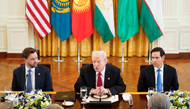
Both parties are fighting for the votes of Catholics, who make up about a quarter of the national electorate and even more in several key states.
By DAVID D. KIRKPATRICKSCRANTON, Pennsylvania - Until recently, Matthew Figured, a Sunday school teacher at the Holy Rosary Roman Catholic Church here, could not decide which candidate to vote for in the presidential election.
He had watched progressive Catholics work with the Democratic Party over the last four years to remind the faithful of the party’s support for Catholic teaching on the Iraq war, immigration, health care and even reducing abortion rates.
But then his local bishop barred Senator Joseph R. Biden Jr. of Delaware, the Democratic vice-presidential nominee, from receiving communion in the area because of his support for abortion rights.
Finally, bishops around the country scolded another prominent Catholic Democrat, House Speaker Nancy Pelosi of California, for publicly contradicting the church’s teachings on abortion, some discouraging parishioners from voting for politicians who hold such views.
Now Mr. Figured thinks he will vote for the Republican candidate, Senator John McCain of Arizona. “People should straighten out their religious beliefs before they start making political decisions,” Mr. Figured, 22, said on his way into Sunday Mass.
A struggle within the church over how Catholic voters should think about abortion is once again flaring up. Political partisans are preparing an all-out battle for the support of practicing Catholics in towns like Scranton that could sway the vote in states where the race is tight.
The theological dispute is playing out in diocesan newspapers and weekly homilies, while the campaigns scramble to set up phone banks of nuns and private meetings with influential bishops.
The Catholic vote, once reliably Democratic, has been split nearly in half in recent presidential races. Evenly divided in a New York Times-CBS News poll over the summer, Catholics make up about a quarter of the national electorate and about a third in the hotly contested states of Michigan, Missouri, Ohio and Pennsylvania.
“Whoever wins the Catholic vote will generally win our state and, most of the time, the nation,” said G. Terry Madonna, a political scientist at Franklin & Marshall College in Lancaster, Pennsylvania.
And Scranton is a focus of special attention this year. Senator Barack Obama of Illinois, who generally underperformed with Catholics in the Democratic primary, lost the surrounding Lackawanna County by a ratio of three-to-one in the Democratic primary to Senator Hillary Rodham Clinton of New York.
Many Clinton supporters here said they were planning to vote for Mr. Obama, some saying they sided with their labor unions instead of the church and others repeating liberal arguments about church doctrine broader than abortion.
“I think that one of the teachings of God is to take care of the less fortunate,” said Susan Tighe, a lawyer.
But more said they leaned toward Mr. McCain, citing both his experience and his opposition to abortion.
After the 2004 election, progressive Catholics started to organize and appeared to win some victories. Last fall, the bishops’ conference revised its official statement on voting priorities to explicitly allow Catholics to vote for a candidate who supports abortion rights if they do so for other reasons. The statement appeared to leave room for Democrats to argue that social programs were an effective way to reduce abortion rates, an idea the party recently incorporated into its platform.
The debate is already playing out in the letters section of Scranton’s newspaper, said Jean Harris, a political scientist at the Jesuit-run University of Scranton. “It is a running debate between Catholics saying ‘abortion is the only issue’ and others saying ‘you have to look at the whole teaching of the church,’ ” she said.
스마터리빙
more [ 건강]
[ 건강]이제 혈관 건강도 챙기자!
[현대해운]우리 눈에 보이지 않기 때문에 혈관 건강을 챙기는 것은 결코 쉽지 않은데요. 여러분은 혈관 건강을 유지하기 위해 어떤 노력을 하시나요?
 [ 건강]
[ 건강]내 몸이 건강해지는 과일궁합
 [ 라이프]
[ 라이프]벌레야 물럿거라! 천연 해충제 만들기
 [ 건강]
[ 건강]혈압 낮추는데 좋은 식품
[현대해운]혈관 건강은 주로 노화가 진행되면서 지켜야 할 문제라고 인식되어 왔습니다. 최근 생활 패턴과 식생활의 변화로 혈관의 노화 진행이 빨라지고
사람·사람들
more
[인터뷰] “미국 최고의 중학생으로 교육할 것”
LA 한인타운 내 최초의 한인 운영 수학·과학 중학교인 ‘윈저 아카데미’(WMSA, 4055 Wilshire Blvd. #400, LA)가 지…

KAF, 23개 비영리단체에 22만여불 지원
LA에 본부를 둔 커뮤니티 재단 KAF(Korean American Foundation·이사장 존 임)가 지난 5일 EK 갤러리에서 ‘2025…
“1세대 부모님 잘 케어하기”
한인 1세대 부모를 모시고 2세대 자녀를 키우고 있는 이른바 ‘샌드위치 세대’ 한인들을 위해 노부모를 잘 케어하기 위한 각종 정보를 총망라해 …
“이념 넘어 상호 존중, 한반도 평화의 기반”
장병우 LA 평통 신임회장이 평통의 역할을 강조하고 있다. [박상혁 기자]“이념보다 중요한 건 상호 존중입니다. 서로를 인정하는 데서 한반도 …
센터메디컬그룹 제4회 ‘이웃섬김’ 시니어 골프대회…
센터메디컬그룹(Center IPA)이 주최한 제4회‘이웃섬김’ 시니어 골프대회가 지난 3일 부에나팍의 로스 코요테스 컨트리클럽에서 130여 명…
많이 본 기사
- 트럼프, 인도엔 관세로 벌준 러産원유수입, 헝가리엔 1년간 용인
- ‘대장동 항소 포기’ 거센 후폭풍…정진우 중앙지검장 전격 사의
- 울산화력발전소, 철제 타워 하단부터 철거… ‘안전’은 없었다
- ‘16kg 감량’ 윤정수, 턱선 살아난 새신랑..원진서와 미공개 웨딩화보
- 트럼프 정부, 관세로 큰돈 벌었다고 생색 내더니… 패소 피하려 “세수와 무관” 말 뒤집기
- 차인표·신애라의 ‘가수 아들’ 차정민, 결혼한다.. “대기업 전 임원 딸=예비신부”
- 국힘 “檢, ‘李대통령 방탄’ 대장동 항소포기…권력앞 무릎꿇어”
- 與 “檢, 대장동 ‘항소 포기’아닌 ‘자제’…법리 판단에 따른 것
- 미 비만치료제 가격 인하 발표 중 실신 소동
- “위험한 일 아니라고 했는데…” 울산 발전소 빈소 찾은 유족 오열
- 국가과학자 100명 뽑는다… AI 등 인재 육성
- 머스크 “AI 칩 자체공장도 만들겠다”
- 울산화력 실종자 수색 사흘째 난항…현장엔 비까지 내려
- “한국서 짓고 미국서 연료 쓰는 ‘한국형 원잠(원자력 추진 잠수함)’ 추진”
- 울산 매몰 사고 9명 모두 하청 노동자
- 화력발전소 붕괴, ‘맨 위’부터 철거 안 해… 매뉴얼 지켰나
- 해병특검, 尹에 11일 오전 세번째 출석 통보…尹측 “논의할 것”
- ‘APEC 외교 성과’ 대통령 지지율 63%
- 캘리포니아 다시 6달러대 유가 위기
- 이사 온 집 정원 팠더니 금화·금괴 ‘와르르’…하루아침에 벼락부자 된 프랑스 남성
- 오세훈 “여론조사 조작” vs 명태균 “吳대납 지시”…특검 대질착수
- “자꾸 머리카락 왜 이렇게 빠지지” 했는데…알고 보니 전날 마신 ‘이것’ 때문?
- 상원, 정부 셧다운 돌파구 찾나… 튠 의장 ‘임시 지출안’ 추진”
- “美, 중국견제 기대하며 韓에 원잠 허용…韓 생각과는 괴리”
- [주목받는 한인 기업] “친환경, 건강한 튀김 조리기기로 시장 석권할 것”
- 미국 면역학회 효능 입증, 기념 고객감사 프로모션
- 봉사회 기금 모금 골프대회
- 겨레얼살리기국민운동본부 SF 베이지역 지부 출범
- 상원, 정부 셧다운 돌파구 찾나… 튠 의장 ‘임시 지출안’ 추진”
- 살림으로 뿌리내리다- 테이크루트 안미정 대표의 요리 이야기 (1)
- [알립니다] 오늘부터 ‘살림으로 뿌리내리다’ 연재
- “백김치 만들었어요”
- ‘수입 1조원’ 호날두, 최고가 구매품은 ‘820억짜리’ 이것
- ‘곁의 힘’ 포럼 주최
- “샌프란시스코서 되살아난 독립운동 정신”
- 국립 국악원, Del Sol 현악4중주단과 동서 음악 페스티발
- ‘유대혐오 방치 혐의’ 코넬대도 트럼프 행정부와 합의
- WSJ “삼성, 美서 신용카드출시 추진…英은행 바클레이스와 제휴”
- <이정훈 기자의 음악 산책>
- 그래미, K팝 대거 지명에 美언론 “드디어 인정…놀랍지 않아”
- 코드 안맞으면 아웃… “퇴역·좌천 美장성, 트럼프 2기에 20여명”
- ‘사기 혐의’ 이천수, 고소인과 합의 “오해에서 비롯된 해프닝”[전문]
- “주민 엑소더스 이유 있었네”… 가주 조세부담 전국 1위
- 檢, ‘대장동 비리’ 항소포기…수사팀 “지휘부가 항소금지 지시”
- “당뇨병·비만 등 질병 있으면 美 이민 비자 거부될 수도”[CBS]
- “이런 XX들” 장윤정, 사망 가짜뉴스에..도경완 분노
- 트럼프, ‘중국 공안에 협조’ 전직 뉴욕경찰 사면
- LAX 여객기 운항 강제 감축… 연말 ‘항공대란’ 불보듯
- 서미라·선경록 작가 공동 전시회
- “테슬라 머스크, 1조달러까지 보상받는다”
1/5지식톡

-
 테슬라 자동차 시트커버 장착
0
테슬라 자동차 시트커버 장착
0테슬라 시트커버, 사놓고 아직 못 씌우셨죠?장착이 생각보다 쉽지 않습니다.20년 경력 전문가에게 맡기세요 — 깔끔하고 딱 맞게 장착해드립니다!장착비용:앞좌석: $40뒷좌석: $60앞·뒷좌석 …
-
 식당용 부탄가스
0
식당용 부탄가스
0식당용 부탄가스 홀세일 합니다 로스앤젤레스 다운타운 픽업 가능 안녕 하세요?강아지 & 고양이 모든 애완동물 / 반려동물 식품 & 모든 애완동물/반려동물 관련 제품들 전문적으로 홀세일/취급하는 회사 입니다 100% …
-
 ACSL 국제 컴퓨터 과학 대회, …
0
ACSL 국제 컴퓨터 과학 대회, …
0웹사이트 : www.eduspot.co.kr 카카오톡 상담하기 : https://pf.kakao.com/_BEQWxb블로그 : https://blog.naver.com/eduspotmain안녕하세요, 에듀스팟입니다…
-
 바디프렌드 안마의자 창고 리퍼브 세…
0
바디프렌드 안마의자 창고 리퍼브 세…
0거의 새제품급 리퍼브 안마의자 대방출 한다고 합니다!8월 23일(토)…24일(일) 단 이틀!특가 판매가Famille: $500 ~ $1,000Falcon: $1,500 ~ $2,500픽업 & 배송직접 픽업 가능LA…
-
 바디프렌드 안마의자 창고 리퍼브 세…
0
바디프렌드 안마의자 창고 리퍼브 세…
0거의 새제품급 리퍼브 안마의자 대방출 한다고 합니다!8월 23일(토)…24일(일) 단 이틀!특가 판매가Famille: $500 ~ $1,000Falcon: $1,500 ~ $2,500픽업 & 배송직접 픽업 가능LA…
케이타운 1번가
오피니언

11·4 선거에 드러난 민심 직시해야

‘얌체’ 관행 끊고 평통의 품격 세워야
 조지 F·윌 워싱턴포스트 칼럼니스트
조지 F·윌 워싱턴포스트 칼럼니스트 [조지 F. 윌 칼럼] 빌 게이츠의 ‘기후 변화’에 대한 입장 변화
 손영아 문화 칼럼니스트·YASMA7 대표
손영아 문화 칼럼니스트·YASMA7 대표 [한국춘추] 펄먼 할아버지의 80년 인생 이야기
 김인자 시인·수필가
김인자 시인·수필가 [금요단상] “가을에 스며있는 지혜”
 김현수 / 서울경제 논설위원
김현수 / 서울경제 논설위원[만화경] 굿바이 딕 체니

[왈가 왈부] 막말·고성에 ‘배치기’까지… 선진화법 무색한 ‘동물국감’
 이상희 UC 리버사이드 교수 인류학
이상희 UC 리버사이드 교수 인류학 사소하지 않은 일상
 윤민혁 서울경제 실리콘밸리특파원
윤민혁 서울경제 실리콘밸리특파원 [실리콘밸리 View] MS 독점 벗어난 오픈AI, AWS 대형 계약
1/3지사별 뉴스

‘30대 사회주의자' 맘다니, 최초 무슬림 뉴욕시장 당선
초미의 관심을 모았던 뉴욕시장 본선거에서 조란 맘다니 민주당 후보가 승리하면서 역대 최초의 무슬림 뉴욕시장이 탄생했다. 초박빙 판세로 여겨졌던…
‘출구 못찾는’ 정부 셧다운…‘역대최장’ 36일 신기록

한국학교협 분쟁, 법원 선택은
메릴랜드 하워드카운티 순회법원이 5일 미 전역의 1,000여개 한글학교를 대표하는 뿌리교육 단체인 재미한국학교협의회(The National A…
구순 노인의 빛나는 역사 노익장

상원, 정부 셧다운 돌파구 찾나… 튠 의장 ‘임시 지출안’ 추진”
사상 최장 기간 정부 셧다운이 이어지는 가운데, 상원 다수당 대표 존 튠(John Thune) 의장이 임시 지출안을 제안하며 사태 해결에 나섰…
봉사회 기금 모금 골프대회

오늘 하루 이 창 열지 않음 닫기 


















































.png)


댓글 안에 당신의 성숙함도 담아 주세요.
'오늘의 한마디'는 기사에 대하여 자신의 생각을 말하고 남의 생각을 들으며 서로 다양한 의견을 나누는 공간입니다. 그러나 간혹 불건전한 내용을 올리시는 분들이 계셔서 건전한 인터넷문화 정착을 위해 아래와 같은 운영원칙을 적용합니다.
자체 모니터링을 통해 아래에 해당하는 내용이 포함된 댓글이 발견되면 예고없이 삭제 조치를 하겠습니다.
불건전한 댓글을 올리거나, 이름에 비속어 및 상대방의 불쾌감을 주는 단어를 사용, 유명인 또는 특정 일반인을 사칭하는 경우 이용에 대한 차단 제재를 받을 수 있습니다. 차단될 경우, 일주일간 댓글을 달수 없게 됩니다.
명예훼손, 개인정보 유출, 욕설 등 법률에 위반되는 댓글은 관계 법령에 의거 민형사상 처벌을 받을 수 있으니 이용에 주의를 부탁드립니다.
Close
x